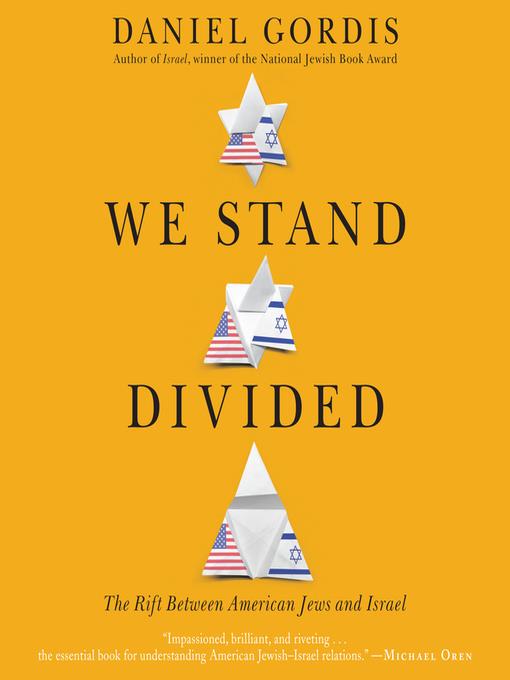
We Stand Divided
The Rift Between American Jews and Israel
کتاب های مرتبط
- اطلاعات
- نقد و بررسی
- دیدگاه کاربران
نقد و بررسی

June 17, 2019
A gloomy view of relations between American Jews and Israel is provided by Jerusalem Post columnist Gordis (Saving Israel) in this thoughtful examination of the history of relations between the two major Jewish communities. Gordis opens his analysis by quoting recent provocative remarks from Israeli diplomatic officials Alon Pinkas and Tzipi Hotovely. While Pinkas believes Israel’s policies stand at the heart of the divide, Hotovely believes American Jews fail to fully understand Israel’s realities. After setting up the rift, Gordis pulls back to offer a wider perspective, noting that for much of the time since political Zionism was created in 1897, the relationship between the American and Zionist Jewish communities “has been complex at best and often even openly antagonistic.” He makes a persuasive case that fundamental issues—such as the conflict between the universalist ideals of the U.S. and its Jewish population, and Israel’s particular religious nationalism—have always been at the heart of the schism. In the end, he believes the situation is not susceptible to easy resolution—even if Israel achieved peace with the Palestinians. Unfortunately, Gordis’s cogent presentation is marred by significant omissions, in particular the political alliance of President Trump and Prime Minister Benjamin Netanyahu. Nonetheless, this will be a valuable conversation starter for Jewish communities within the U.S. and Israel.

August 1, 2019
A winner of the National Jewish Book Award urges a thoughtful reconciliation between Israelis and American Jews for the future of all Jews. Gordis (Senior Vice President/Shalem Coll.; Israel: A Concise History of a Nation Reborn, 2016, etc.) takes up a much-used but apt simile that the relationship between the Israelis and the American Jews is like a troubled marriage: What should be done? Should they split, get counseling, or separate? As the author writes, "the American and Israeli Jewish communities total more than 85 percent of the Jewish world and are therefore likely to be the communities that determine the course of Jewish history." Surveying the landscape, the author, a lucid guide to this contentious topic, concludes that "the crux of the problem between the communities is not what Israel does, but what Israel is." American Jews freely criticize Israel and its strong-armed policies toward the Palestinians, but Israelis often believe that Americans--comfortable and not constantly faced with security threats--have no idea what it means to live surrounded by hostile countries. Gordis argues that the intense love affair of American Jews with Israel buckled in 1982, when Israeli military perpetrated massacres at the Palestinian refugee camps at Sabra and Shatila, leaving American Jews "humiliated and shamed by the country to which they had once pointed with pride." This was a turning point. Yet the author also concisely highlights ongoing fundamental tension points between the two countries, including the Zionist dream that Jews can be the active agents in their story rather than passive victims. The sticking point of religion ("Who and What are the Jews?") is another point of contention, as American Jews tend to be non-Orthodox in opposition to the enormous power of the right-wing Orthodox element in Israel, who define identity as well as the role of the Hebrew language, which most Americans do not speak. A deliberative academic work that rises above hackneyed arguments with significant research and a great deal of heart.
COPYRIGHT(2019) Kirkus Reviews, ALL RIGHTS RESERVED.

























دیدگاه کاربران